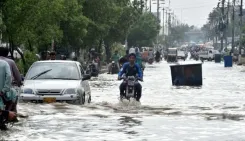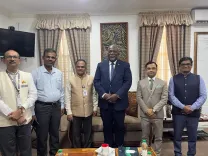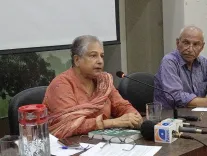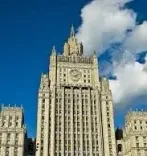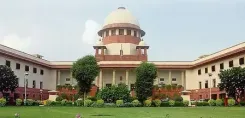Did the US Really De-escalate the India-Pakistan Conflict?
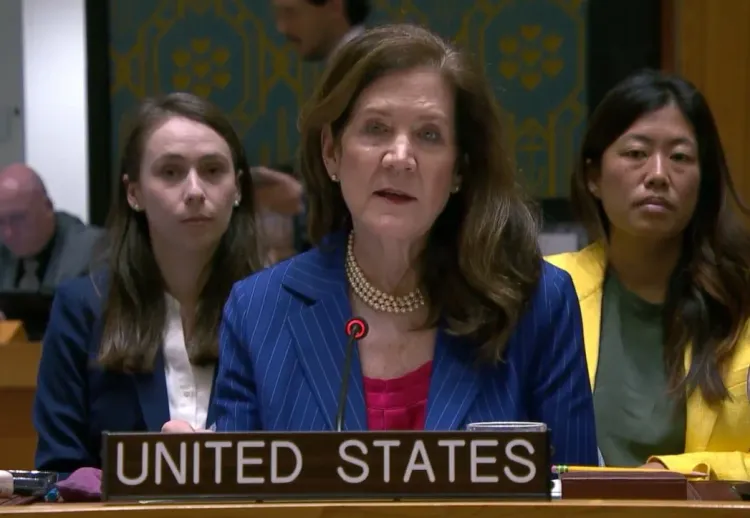
Synopsis
Key Takeaways
- The US claims involvement in de-escalating the India-Pakistan conflict.
- India asserts the issue was resolved through bilateral discussions.
- Operation Sindoor targeted terrorist camps in response to an attack.
- Diplomatic claims reflect differing perspectives on conflict resolution.
- The Resistance Front has been designated a global terrorist organization.
United Nations, July 23 (NationPress) The United States presented to the Security Council President Donald Trump’s assertion of having resolved the India-Pakistan conflict in May; however, New Delhi maintained that the issue was settled through bilateral discussions.
Acting US Representative Dorothy Shea noted on Tuesday that the conflict between India and Pakistan followed the terrorist attack in Pahalgam by The Resistance Front, which was one of those de-escalated by “US leadership” in the past three months, reiterating a claim often made by Trump.
“The United States, under President Trump’s leadership, played a crucial role in encouraging the parties to reach these resolutions, which we commend and support,” she stated.
India’s Permanent Representative P. Harish firmly asserted that it was “directly concluded” at Pakistan’s request to India.
Operation Sindoor “achieved its primary objectives, with a cessation of military activities directly concluded at Pakistan's request,” he mentioned.
Harish elaborated that Operation Sindoor, initiated in response to the massacre of 26 individuals by The Resistance Front, an offshoot of Lashkar-e-Taiba backed by Pakistan, “was focused, measured, and non-escalatory in nature.”
The operation was driven by the Council’s statement on “the necessity to hold accountable the perpetrators, organizers, financiers, and sponsors” of the Pahalgam attack, targeting terrorist camps in Pakistan and Pakistan-occupied Jammu and Kashmir, he explained.
Shea and Harish spoke during the Security Council open debate on “Multilateralism and Peaceful Settlement of Disputes,” presided over by Pakistan’s Deputy Prime Minister Mohammad Ishaq Dar.
Trump has consistently claimed, “I stopped the war between Pakistan and India,” a statement echoed by Secretary of State Marco Rubio.
Trump asserted that the India-Pakistan conflict “would have escalated to a nuclear war within a week, the way it was going.”
He claimed he halted it by informing the leaders of both nations that without stopping the conflict, there would be no trade deal.
PM Modi clearly communicated to Trump during a phone conversation last month that there was no mediation or quid pro quo regarding a trade deal between New Delhi and Washington concerning the cessation of conflict with Pakistan, according to the External Affairs Ministry.
“Prime Minister Modi explicitly conveyed to President Trump that throughout this entire sequence of events, there was no discussion, at any level, regarding an India-US Trade Deal, or any proposal for mediation by the U.S. between India and Pakistan,” the ministry stated.
Pakistan’s Director General of Military Operations, Major General Kashif Abdullah, directly contacted his Indian counterpart, Lieutenant General Rajiv Ghai, to request a ceasefire, according to External Affairs Minister S. Jaishankar.
Additionally, Shea mentioned that the other two conflicts Trump had de-escalated involved Israel and Iran, as well as the Democratic Republic of Congo and Rwanda.
Recently, Rubio declared that the US has designated The Resistance Front (TRF) as a global terrorist organization, reinforcing “President Trump’s call for justice for the Pahalgam attack.”

